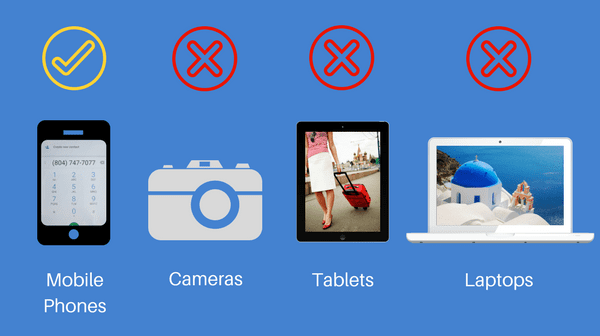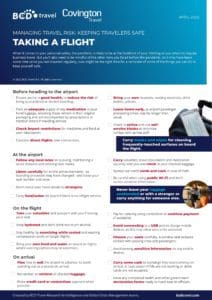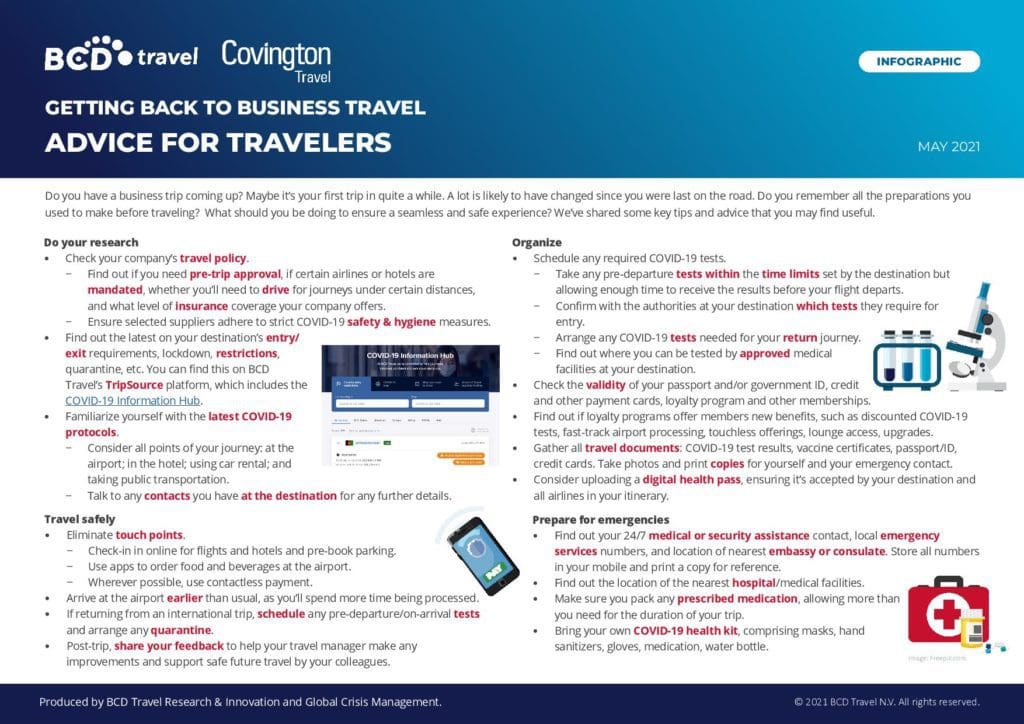 Keeping yourself entertained on the long flight from Dubai to the U.S. just got more difficult. On March 21, 2017, the U.S. Department of Homeland Security instituted a carry-on electronics ban for travel on non-stop flights coming into the U.S. from 10 airports in the Middle East and North Africa. The United Kingdom quickly instituted a similar ban on inbound flights from six countries.
Keeping yourself entertained on the long flight from Dubai to the U.S. just got more difficult. On March 21, 2017, the U.S. Department of Homeland Security instituted a carry-on electronics ban for travel on non-stop flights coming into the U.S. from 10 airports in the Middle East and North Africa. The United Kingdom quickly instituted a similar ban on inbound flights from six countries.
What devices does the electronics ban restrict?
The electronic ban applies to all devices larger than a cell phone, including cameras, tablets, e-readers, laptops, DVD players, and electronic games. All of these can still be packed in checked luggage, but they can’t go in the passenger cabin on specific flights. Medical devices needed during the flight are not banned from the cabin.
The U.S. requirements don’t specify a size limitation for cell phones, but the U.K. restricts phones larger than 16.0cm x 9.3cm x 1.5cm (6.29in x 3.66in x .59in). If you’re not sure your phone meets the requirements, contact your airline.
Which airports are affected?
The ban applies to non-stop flights to the U.S. from the following airports:
- Queen Alia International Airport, Amman, Jordan (AMM)
- Cairo International Airport, Cairo, Egypt (CAI)
- Ataturk International Airport, Istanbul, Turkey (IST)
- King Abdulaziz International Airport, Jeddah, Saudi Arabia (JED)
- King Khalid International Airport, Riyadh, Saudi Arabia (RUH)
- Kuwait International Airport, Kuwait (KWI)
- Mohammed V International Airport, Casablanca, Morocco (CMN)
- Hamad International Airport, Doha, Qatar (DOH)
- Dubai International Airport, Dubai, UAE (DXB)
- Abu Dhabi International Airport, UAE (AUH)
Several of these airports are global connecting hubs, so travelers should be aware that if they transit one of the affected airports on the way to the U.S., the electronics ban applies. That means if you fly from Johannesburg to Washington Dulles with a connection in Dubai, you’ll have to check your personal electronics in South Africa for the entire flight.
What happens at the airport?
If flying from an affected airport, plan to arrive earlier than normal and expect some inefficiency as travelers pack their personal devices in checked bags at the last minute. The airline will likely ask you if you have electronics in your carry-on luggage, but don’t depend on them to remind you. Currently, Emirates and Turkish Airlines allow you to keep your electronics with you until boarding. They let you gate check electronics in “secure” packaging and they deliver it to you at the baggage carousel after the flight.
Update (3/31/17): Qatar Airways has just announced a new “Laptop Loan” service that will provide business class travelers with a replacement laptop to work on during their flight. For all passengers, they also offer a gate-check for electronics.
Tips to Protect Your Devices
For years best practice was to never put valuables in checked luggage, but now you may not have a choice. The new electronics ban increases the possibility of device theft or damage during travel on affected flights. If you must check your electronics, here are some ways to help keep them safe:
- Set up a passcode or fingerprint lock for the device.
- Do a full backup before travel.
- Shut the device completely down, rather than leaving in sleep mode.
- Make a list of electronics in your suitcase and take a photo to help with an insurance claim in case something gets lost, stolen or damaged. Note: Many travel insurance policies have a $500 coverage limit for electronics – always check the fine print.
- Protect electronics with proper padding in your suitcase.
- Limit “tamper time” for your bags by getting to baggage claim as soon as possible.
There are circumstances when you may wish to use a luggage forwarding service such as Luggage Free, or modify your travel itinerary to avoid the affected flights.
- Your company policy prohibits putting company laptops in checked baggage
- Business events or trade shows where key electronics are critical at your destination
- Photojournalists carrying expensive and specialized equipment
- When electronics contain sensitive or proprietary information
These tips will reduce the risk of something happening to your electronics while you travel, but they really do nothing to help keep you occupied on a long flight. Instead of e-readers, electronic games, podcasts, movies or even work to while away the time, you’ll just have to resort to an old-fashioned paperback.
If you have further questions on the electronics ban, contact the knowledgeable business travel team at Covington Travel.







Leave a Reply